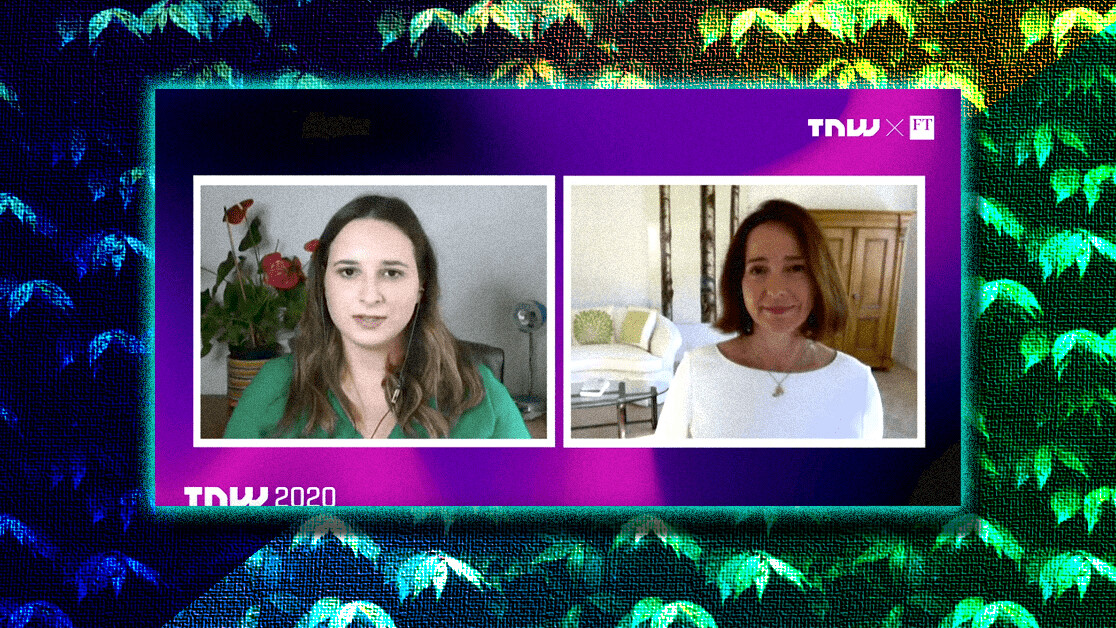Sarah Friar spoke at our flagship online event, TNW2020, about how the power of kindness can work as a foundation for business.

Kindness and business can go hand-in-hand and Sarah Friar, who joined neighborhood hub app Nextdoor, as CEO in 2018, subscribes to this school of thought.
“Typically, people come to Nextdoor for the utility, to find a plumber, a babysitter, or a great place in their local community to grab a coffee at the weekend — but they stay for the community,” she said at TNW2020.
Entrepreneurs, founders, startup employees, and investors all take a huge gamble by starting, working in, or funding a company that seeks to disrupt a particular industry or problem.
Indeed, the stakes are high. Success and scale are the prime motivators; there are bills to pay, teams to grow, ideas to execute, and returns to deliver.
Personally, though, I feel it’s important for all these stakeholders to be aware of the fact that by starting a company, disrupting an industry, and solving a problem they are also able to create something that transcends the very business they’ve created.
Don’t roll your eyes. It’s true — and Friar agreed: “If you create a flywheel whereby your business model creates cash for you to reinvest into what your platform does for good, then you’re really on to something.”
Let that sink in, like really sink in.
You need to walk the walk
There are countless quotes that highlight the evils of capitalism, that in some way allude to profit and kindness being mutually exclusive — but, please, erase this notion from your mind. You can totally make money while also having a social purpose.
If we look at Nextdoor, Sarah explained how the company follows a three-pronged monetization approach. Advertisers pay to be featured on the platform’s main newsfeed, but they are vetted to ensure that they’re “endemic to a local neighborhood” and add value to users.
The company also works with local businesses, allowing them to use the platform to communicate with customers by putting local deals into the newsfeed. The third source of income comes from public agencies. “A huge part of local good and keeping neighborhoods safe is making sure they’re getting access to the best, most current information, often from their local officials,” Friar added, noting how this has become increasingly important as a result of the COVID-19 pandemic.
Working with kind brands, in this case, advertisers “can be good, and it can be a strong business model,” but “You’ve got to walk the walk, there’s actually no other way to do it. You have to be authentic and genuine,” Friar said.
In this day and age, businesses are serving increasingly savvy consumers. Clients are holding companies accountable and demanding greater transparency. It’s no longer possible to make claims that go unchecked. — and this is a good thing. Right?
If a company builds its brand on the principle of sustainability, it must ensure its entire process of sourcing, production, and delivery meets adequate requirements — or else face mounting criticism. Often the damage is irreparable.
The same applies when it comes to building kindness into your core product. If your product is about connecting people and bringing local communities closer together, helping people help others, then you have to make sure kindness transcends your product.
“When we talk about our purpose, being kind, we need to make sure that we’re living up to that moniker. So first and foremost, we’re founded in trust. So we want to make sure that when you come on Nextdoor, you feel safe and like you’re part of your community,” noted Friar.
To ensure this is the case, Nextdoor spends a lot of time verifying a person’s existence and address. This level of scrutiny requires additional resources and it does, Friar admitted, slow down growth.
“If we were a ‘growth at any cost’ platform,’ we wouldn’t do this,” Friar said, explaining that these measures are in place to safeguard users who often share a lot of things on the platform that make them vulnerable.
Kindness must seep into everything
Being a kind company means Nextdoor also has a responsibility to ensure that content shared on its platform is, well, kind.
Back in June, Friar published a statement saying “that racism has no place on Nextdoor.” The statement came a couple of weeks after George Floyd was killed in the US by a white policeman kneeling on his neck — but the truth is that cases of racial profiling on Nextdoor had been a problem long before then.
Several outlets, including Splinter and Seattle Magazine, had rung the alert bell as early as 2015, prompting Nextdoor to unveil its solution to Wired in 2017, about a year before Friar joined the platform.
Dealing with the proliferation of racism, or other types of hate speech, comes with the territory but it can’t be ignored.
“In the last couple of months, we rolled out something called the neighbor pledge. We did this very purposely because we want people to know that we’re a community guideline platform,” Friar noted, adding that when users join the platform they are “signing up to be respectful, to not discriminate, and to make sure you’re not doing things like using hate speech or engaging in racism.
“We are not perfect and we still have work to do on that front,” Friar acknowledged.
Externally, Nextdoor markets itself a kind company but Friar is also tasked with ensuring that this seeps through the ranks internally — and a crucial part of that is attracting and hiring the right talent.
“When we hire people we ask them about the core values we hold true,” she said.
If you hire people, look after them, coach them, develop them, empower them, and treat them with kindness.
A kind company powered by equally kind people who represent a company’s value is a force to be reckoned with.
And remember, you don’t have to be perfect, you just have to try — and if you do, you can definitely create something that redefines kindness and purpose in the corporate world.
Get the TNW newsletter
Get the most important tech news in your inbox each week.





